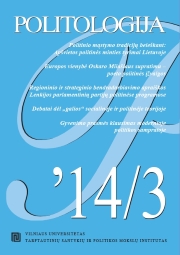REGIONINIO IR STRATEGINIO BENDRADARBIAVIMO APRAIŠKOS LENKIJOS PARLAMENTINIŲ PARTIJŲ POLITINĖSE PROGRAMOSE
MANIFESTATIONS OF REGIONAL AND STRATEGIC COOPERATION IN THE PROGRAMS OF POLAND’S PARLIAMENTARY PARTIES
Author(s): Mindaugas NorkevičiusSubject(s): Politics / Political Sciences
Published by: Vilniaus universiteto leidykla & VU Tarptautinių santykių ir politikos mokslų institutas
Summary/Abstract: This article analyses programs of Poland Parliamentary political parties, which exclude vectors of foreign politics in the context of regional collaboration. The most important concept in this article is analysis of political parties and their ideologies, which show their importance in forming foreign politics in Poland. Priority areas of foreign politics in Poland are presented in the text. Analysis was conducted using analysing programs (2011) of Parliamentary parties such as Civic Platform, Law and Justice, Democratic Left Alliance and Polish People Party. The case of Palikot’s movement is absent in the article due to the fact that the vector of foreign politics is not excluded in its program. The main priorities of Poland’s foreign politics, its position in forming and performing the politics are analysed in the text. The focus of it is on how these priorities are presented in the programs of Parliamentary parties. There are two types of vectors which are useful in forming foreign politics: inner (e.g., features of party system or influence of other political subjects) and outer (relations between foreign politics in Poland and other countries, power of negotiation, ability to arrange coalitions). The role of Poland’s political parties in foreign politics is not clearly marked: it depends on various circumstances, most often on the composition of government. Identity, value system, election strategies: these are the basic concepts which influence the role of ideology in forming foreign politics. The main aim of ideology, however, is to adapt to new conditions of political arena. Ideology is not a dominant factor in forming the identity of political parties in Poland. Partial system in Poland is characterised as having weak base of experience and having a tendency to strengthen the role of the leader despite the fact that this role is restricted by political parties and ideology. On the other hand, despite the fact that ideology is becoming less dominant in forming political decisions, it is still important in political discourse. An assumption can be made that political system in Poland is marked by the weakness of partial ideology. Priorities of foreign politics in programs of various political parties in Poland are similar. Pro-European tendencies are reflected in the rhetorics of Civic Platform and Democratical Left Alliance. Economical factor is the most important in Law and Justice and Polish People Party programs. Transatlantic relations between Poland and NATO are important in programs of Civic Platform and Law and Justice. Agriculture in Poland and its problems are important factor mentioned in the programs of all analysed parties. Good relations with neighbour states are the priority factor in programs of all analysed parties, but Civic Platform and Democratic Left Alliance prefer it the most. Relations of Poland and developing countries as well as separate regions is also an important concept in programs of political parties.
Journal: Politologija
- Issue Year: 2014
- Issue No: 3 (75)
- Page Range: 58-85
- Page Count: 28
- Language: Lithuanian

